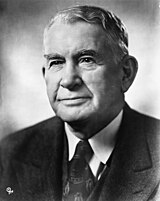United States Senate elections, 1938
|
|
|||||||||||||||||||||||||||||||||||||||||||||||||||||||||||||||||
|---|---|---|---|---|---|---|---|---|---|---|---|---|---|---|---|---|---|---|---|---|---|---|---|---|---|---|---|---|---|---|---|---|---|---|---|---|---|---|---|---|---|---|---|---|---|---|---|---|---|---|---|---|---|---|---|---|---|---|---|---|---|---|---|---|---|
|
|||||||||||||||||||||||||||||||||||||||||||||||||||||||||||||||||
|
36 of the 96 seats in the United States Senate 49 seats needed for a majority |
|||||||||||||||||||||||||||||||||||||||||||||||||||||||||||||||||
|
|||||||||||||||||||||||||||||||||||||||||||||||||||||||||||||||||

Republican holds
Republican pickups
Democratic holds
Democratic pickups
|
|||||||||||||||||||||||||||||||||||||||||||||||||||||||||||||||||
|
|||||||||||||||||||||||||||||||||||||||||||||||||||||||||||||||||
The United States Senate elections of 1938 occurred in the middle of Franklin D. Roosevelt's second term. This occurred six years after the Democratic landslide in the 1932 election, and so the opposition Republicans gained seven seats from the Democrats. However, the Democrats retained a commanding lead over the Republicans with more than two-thirds of the chamber.
A contemporary account cited a number of reasons for the losses suffered by the Democrats. The first was the Recession of 1937, which had continued into the first half of 1938, and which had arguably weakened public confidence in the administration's New Deal economic policies. Controversy over the Judicial Procedures Reform Bill of 1937 (Roosevelt's "court-packing" plan) was also a major factor. There were, in addition, strains between the more liberal New Deal supporters and the conservative wing of the Democratic party centered in the Southern states. These strains were exacerbated by an effort led by President Roosevelt to target certain conservative senators for defeat in Democratic primaries, including Walter George of Georgia, Millard Tydings of Maryland and Ellison Smith of South Carolina, along with the chairman of the House Rules Committee, John J. O'Connor of New York. While a number of New Deal supporters won primary elections, such as Sen. Alben Barkley in Kentucky, who defeated future baseball commissioner Happy Chandler, Sen. James P. Pope of Idaho, a prominent New Deal supporter, lost his bid for re-nomination, as did California senator William McAdoo, though McAdoo's Democratic opponent Sheridan Downey had campaigned as a liberal New Dealer who would also do more to improve pension plans.
...
Wikipedia


